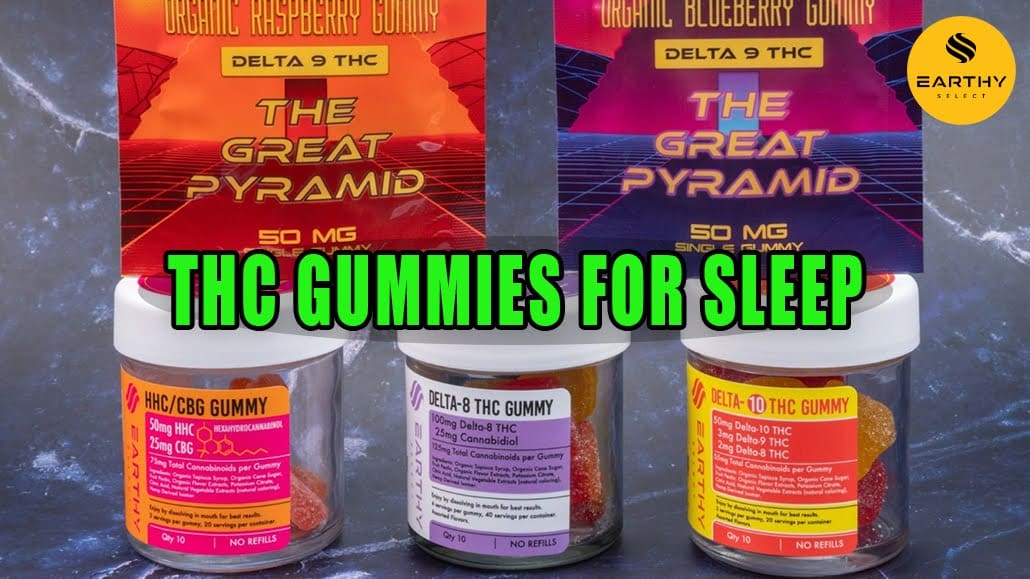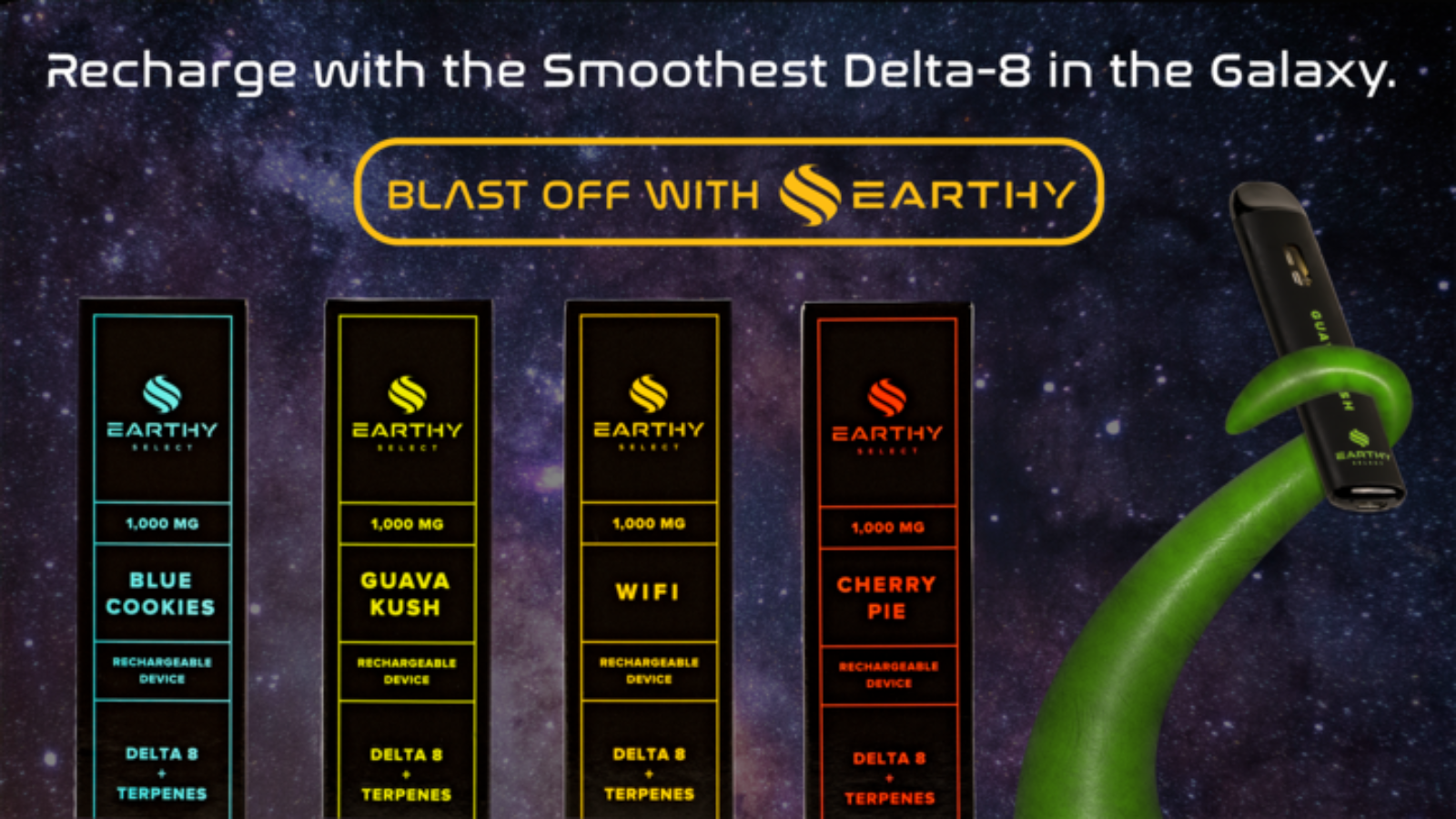How THC Gummies Can Help You Sleep Better at Night
Key Takeaways
- THC gummies may potentially contribute to reduced sleep latency and longer sleep duration through interaction with the endocannabinoid system, although research outcomes vary, and careful dosing is often necessary to minimize side effects such as altered REM sleep or heightened anxiety [1][2].
- In comparison to conventional sleep aids, THC gummies are frequently regarded as a more natural option, though evidence regarding their dependency risk relative to synthetic alternatives remains inconclusive, and individual responses can differ significantly based on factors like metabolism and tolerance [3][4].
- Earthy Select’s THC Gummies are made from organically grown cannabis, undergo thorough testing for safety and potency, and are formulated to offer customizable, consistent effects tailored to personal sleep preferences.
Struggling to find that sweet spot for deep, rejuvenating sleep? Look no further than Earthy Select’s THC Gummies. Our federally compliant Delta-8, Delta-9, and Delta-10 THC Gummies, crafted with organic cannabis from California and Colorado farms, may be just what you need to ease into a restful night. Safety and quality are our mantras — each batch is rigorously tested to guarantee purity and potency in line with US Farm Bill regulations.
Sleep isn’t a luxury; it’s a necessity, and we’re keyed in on THC’s potential to promote healthier sleep patterns. Available in a variety of strengths, Earthy Select’s THC Gummies provide a path to tranquility. Let our THC Gummies guide you to nights filled with the rest you deserve.
Benefits of THC Gummies for Sleep Disorders
Struggling to fall asleep? Many find THC gummies a supportive option. These edible products have recently gained interest for their possible role in enhancing sleep. Indeed, some research and user experiences indicate they may help with falling asleep more quickly and sustaining sleep for more extended periods. For individuals dealing with insomnia or conditions like sleep apnea, THC’s calming effects on the mind might be particularly noteworthy [1][5].
That said, moderation is key. Starting with small doses, or microdosing, may help avoid potential side effects such as anxiety or disrupted sleep patterns. Additionally, gummies offer a practical way to manage intake, allowing users to adjust portions to find a suitable balance for restful sleep.
In addition to sleep support, THC is sometimes associated with pain relief for certain individuals. While further research is needed, some anecdotal feedback and preliminary studies suggest THC might ease discomfort at bedtime, potentially contributing to more uninterrupted sleep in specific cases [2][6]. Whether enjoying Delta-8, Delta-9, or Delta-10 THC gummies, finding the right balance is key.
How THC Interacts with the Body
Figuratively speaking, THC taps into our body’s endocannabinoid system much like a quirky key opening unexpected doors to relaxation. When consumed in forms like gummies, THC metabolizes in the liver, which may enhance its intensity and duration of effect. It then interacts with the brain’s CB1 receptors, potentially lowering neural activity and fostering an environment conducive to sleep. However, the dosage often plays a critical role—too little might have minimal impact, while too much could lead to restlessness or unease [7].
THC also appears to engage with CB2 receptors, which might contribute to pain relief and support restful sleep for some. Individual responses to THC can vary widely, influenced by factors such as metabolism and personal tolerance, resulting in a unique experience with each use [7].
Sleep Disorders and THC: What the Research Suggests
Many individuals in the U.S. face difficulties with sleep, leading some to explore THC, the primary psychoactive component of cannabis, as a potential aid. Modest doses of THC might ease the process of falling asleep by engaging with the body’s endocannabinoid system. However, larger doses could interfere with restorative REM sleep and may contribute to tolerance over time, as highlighted in studies from institutions like the University of Colorado Boulder [2][8].
The effectiveness of THC for sleep support varies across individuals, and while personal accounts often suggest benefits, scientific exploration is still underway. Research published in Cannabis and Cannabinoid Research points to the nuanced effects of THC on sleep, indicating potential promise but underscoring the need for further investigation to draw firm conclusions [9].
How THC Helps with Insomnia and Disrupted Sleep Cycles
THC, the psychoactive element in cannabis, is sometimes considered a possible aid for insomnia and irregular sleep patterns. This is largely due to its interaction with the body’s endocannabinoid system (ECS), which plays a role in sleep regulation. Studies suggest THC might facilitate quicker onset of sleep by promoting a sense of calm, and it may influence sleep stages by increasing deep sleep while reducing REM sleep[1][2].
One potential effect of THC is a reduction in anxiety and stress, common barriers to restful sleep. By possibly quieting an overactive mind, THC may create conditions favorable for sleep. However, finding the appropriate dose is often critical, as excessive amounts could heighten anxiety or cause restlessness [5].
For those awakened by pain or conditions such as sleep apnea, THC might offer some relief by dulling pain perception, which could contribute to longer, less fragmented sleep. That said, regular use may lead to tolerance, and some researchers suggest periodic breaks to maintain its potential effectiveness. While not a universal remedy, ongoing research continues to explore its possibilities for those seeking better rest [6][8].
What Current Studies Say about THC
Exploring the connection between THC and sleep, recent studies provide insight into this intricate relationship. A 2017 review in Current Psychiatry Reports indicates that THC may assist individuals with insomnia in falling asleep more quickly through its interaction with the brain’s endocannabinoid system, though there are important considerations. Notably, THC can reduce REM sleep, which might impact the restorative quality of sleep over time [3].
Finding the right amount of THC is often a delicate balance. Research from 2020 in Frontiers in Pharmacology suggests that microdosing THC may promote relaxation and drowsiness without significant next-day impairment. Conversely, higher doses could lead to disrupted sleep. Timing is also a factor; consuming THC too late in the evening might interfere with rest rather than support it [10].
Even with current studies, definitive answers remain elusive. Research varies in scope and approach, and individual physiology significantly influences outcomes. For those seeking support in falling asleep, THC might be an area to explore with careful attention to dosage and timing [9].
THC Gummies vs Traditional Sleep Aids: A Closer Look
When considering options for better sleep, THC gummies are increasingly noted alongside conventional sleep aids. Unlike the gentle effect of melatonin or the potential grogginess from diphenhydramine, THC—the active component in cannabis—has shown in studies a potential to shorten the time needed to fall asleep and extend sleep duration, particularly at lower doses. However, its influence on REM sleep varies; it may reduce nightmares for some while potentially disrupting essential restorative sleep for others [1][2].
THC gummies typically provide a slower release compared to the immediate impact of many pills, though dosing consistency can be challenging. While the side effects of traditional sleep aids are well-documented, the long-term implications of THC on sleep are still being studied. Ultimately, the choice often involves weighing the known aspects of conventional aids against the emerging, yet less certain, profile of THC gummies to determine a suitable approach [4].
How Effectiveness and Experience Differ
When evaluating THC gummies for sleep support, factors like potency and cannabinoid composition can significantly influence outcomes. Lower doses might gently facilitate sleep, while higher amounts could result in lingering drowsiness the following day. Gummies with a full-spectrum profile may harness the entourage effect, where other cannabinoids and terpenes potentially complement THC’s calming properties for a more balanced rest [7].
Individual responses often vary widely due to differences in metabolism, tolerance, and daily stress levels. A dose effective for one person might not be for another, making personal observation important. As edibles, gummies have a delayed onset, which may support sustained sleep but requires thoughtful timing.
It’s worth noting that the impact of THC is influenced by its interaction with other natural compounds and individual physiology. Starting with a modest dose, using lab-tested products, and gradually adjusting can help identify an optimal balance for restful sleep. Quality and a measured approach to dosing are often key considerations.
Control and Dosing
Dosing is a critical factor when using THC gummies for sleep support. A small amount may assist in falling asleep more quickly, while an excessive dose could lead to prolonged wakefulness or unease. Thus, starting with a modest dose, such as 2.5 mg, and allowing up to an hour to gauge effects is often advisable. Establishing a consistent routine, such as taking the gummy at the same time each evening, may also be beneficial. Check the labeled potency, and study third-party lab results for quality assurance. These measures can further support a tailored approach to managing sleep [10].
Many people prefer either Indica or Sativa strains of cannabis, which differ in their effects. So, if you’re new to cannabis, it might help you find the best product for your needs if you research the effects of each. For example, consider reviewing a guide on Indica vs Sativa products, such as Earthy Select’s THCa Indica Guide.
Lower Risk of Dependency Compared to Synthetic Options
THC gummies are often perceived as a more natural option for sleep support compared to synthetic sleep aids, which are sometimes linked to notable side effects and dependency concerns. THC interacts with the body’s endocannabinoid system, potentially aiding in the regulation of sleep cycles. While some studies suggest a lower risk of physical dependence with THC compared to certain prescription sleep medications, the evidence is not conclusive, and long-term impacts are still under review [3][4].
Though mindful use is generally recommended to avoid tolerance or morning sluggishness, THC gummies might provide a gentler approach to restful sleep for some, aligning with the body’s natural mechanisms for balance. However, caution is advised, as dependency risks have not been entirely ruled out [8].
Appeal of a Plant-based, Natural Alternative
Delta-8, Delta-9, and Delta-10 THC gummies appeal to individuals seeking a more natural approach to restful sleep. Drawing on cannabis’s historical association with relaxation, these gummies may support the body’s transition to sleep without some of the potential downsides of conventional aids, such as morning drowsiness or dependency concerns. Research, including studies in the Journal of Clinical Sleep Medicine, suggests that cannabinoids may positively influence sleep onset and quality, though outcomes are not consistent across all users [11].
While all three varieties fall under the THC umbrella, they work differently in the body. For example, Delta-8 Gummies are especially popular for nighttime use thanks to their reported relaxing effects that help quiet the mind and ease into sleep. Delta-9 Gummies can deliver both calming and euphoric effects depending on your dosage and tolerance, making them a versatile option for those seeking deeper rest or stress relief before bed. On the other hand, Delta-10 Gummies tend to be more energizing and are typically better suited for daytime focus and mood support rather than nighttime use.
With a range of cannabinoid profiles, potencies, and flavors, Earthy Select’s Delta-8, Delta-9, and Delta-10 THC Gummies allow you to personalize your wellness routine—whether your goal is restful sleep, relaxation, or an overall sense of calm.
How to Use THC Gummies Safely for Better Sleep
Thinking about trying THC gummies to support better sleep? Begin with a small dose—perhaps 2.5 to 5 milligrams—and allow about an hour before bedtime to observe the full effect. Creating a conducive sleep environment can also be helpful; consider making your bedroom free of technology, maintaining a cool and dark setting, and incorporating calming sounds. However, it’s crucial to avoid overconsumption, as excessive THC might disrupt sleep patterns [2].
Opt for gummies backed by lab-tested assurances, and store them securely away from children and pets. If you’re new to THC or have underlying health considerations, consulting a healthcare provider is often a prudent step. To help maintain effectiveness, occasional breaks from use might be beneficial to prevent tolerance. Tailoring your approach to THC can support the restful nights you’re seeking, keeping personal needs in focus [8].
Start Small
Considering THC gummies to enhance sleep? It’s often wise to start with a microdose. A small amount, such as 2.5 to 5 milligrams, might suffice. Studies suggest that too much THC may interfere with optimal REM. Remember, the goal is to support rest without interfering with sleep cycles [12].
Why start small? Individual biology significantly shapes the THC experience, with factors like body weight and stress levels playing a role. Initiating with a cautious dose, observing sleep quality, and adjusting as needed can be a practical approach to finding a suitable balance for rest.
Additionally, the entourage effect—where other cannabinoids and terpenes like myrcene interact with THC—can influence outcomes. Given the unique nature of each person’s response, a gradual start helps maintain control over the journey toward restorative sleep [7].
Time It Right
Maximizing the potential of THC gummies for sleep often hinges on timing. For example, taking a gummy about 90 minutes before your intended bedtime may help align its effects with your body’s natural sleep rhythm. With dosage, a conservative approach—starting with 2.5 to 5 milligrams—can be useful to assess your response [10]. Beyond THC, fostering a wind-down routine by dimming lights and limiting screen time may enhance a calming atmosphere, supporting a comprehensive approach to rest.
Make Your Sleep Space Comfy
Restful sleep often begins with a supportive setting. Transforming your bedroom into a tranquil space can involve simple adjustments. For instance, clearing clutter may help reduce stress and promote a sense of calm. Alternatively, using blackout curtains or a sleep mask can help ensure darkness, which supports melatonin production [13]. Maintaining a comfortable room temperature between 18 °C and 24 °C may contribute to optimal sleep conditions. Consider selecting a more comfortable bed or bedding to enhance comfort. Some people benefit from a white noise machine or fan to mask disruptive sounds. Treating your bedroom as a dedicated space for rest can contribute to more consistent sleep quality.
Be Consistent but Flexible
Achieving restful sleep with THC gummies often benefits from a regular routine. Taking your gummy at a consistent time each evening may help signal to your body that it’s time to rest. However, as the body can adapt to a specific dose over time, adjusting the amount or taking periodic breaks might be necessary to sustain potential benefits [8].
Product quality should be a consideration. Also, you should consider the potential effects of Delta-9 vs Delta-8 gummies. For example, if you’re aware that Delta-9 THC may cause anxiety or paranoia for you, consider Earthy Select’s Delta-10 or Delta-8 Gummies. Delta-8 THC has been reported to cause lower levels of anxiety and paranoia compared to Delta-9 THC [14].
If the effects of THC on sleep result in lingering drowsiness, exploring a different dose or integrating other relaxation practices could be helpful. Listening to your body and refining your approach may support optimal rest.
When in Doubt, Talk to Your Doctor
Exploring THC gummies for sleep support can involve navigating uncertainties. For example, individual responses vary, and a dose that benefits one person might not suit another. Thus, it’s important to find the right balance, as higher amounts of THC don’t always yield better results. Additionally, the cannabis market continues to evolve, and product consistency can differ. Always check lab reports before taking THC.
For these reasons, discussing with a healthcare provider before using THC for sleep is generally advisable. They can offer guidance tailored to your health background and any existing medications. This step supports a thoughtful, informed approach to enhancing sleep quality and overall well-being.
Potential Side Effects of Using THC Gummies for Sleep
As with Delta-9, Delta-8 gummies may last from four to eight hours [15]. However, effects beyond rest, such as a lingering sluggishness the next day, may prompt an extra cup of coffee. At night, higher doses could potentially lead to feelings of anxiety or unease, which are not conducive to a peaceful bedtime [5].
Regular use of these gummies might gradually increase tolerance, potentially requiring higher doses over time to achieve similar effects. The possibility of dependency should not be overlooked, and it may be prudent to monitor for signs of reliance, as some research indicates withdrawal effects like sleep disturbances with consistent use [8].
Even milder effects, such as dry mouth or red eyes, are worth noting. Keeping water nearby can help alleviate discomfort from dry mouth. Ultimately, while THC gummies might support restful sleep, remaining attentive to potential side effects can help ensure a balanced approach to nighttime rest.
How Long Do Delta-9 Gummies Last?
Final Thoughts
Ultimately, THC gummies may offer a subtle support toward restful nights. Earthy Select is committed to providing high-quality, federally compliant Delta-9 and Delta-8 THC Gummies crafted to help ease you into better sleep. Our focus on excellence ensures that each gummy is sourced from organic family farms and subjected to stringent testing, offering a reliable option for bedtime support. As we expand our reach nationwide, keep in mind our guiding principle, “Select Your Adventure,” and allow Earthy Select’s THC Gummies to accompany you toward calmer nights and refreshed mornings.
Read more:
Frequently Asked Questions About THC Gummies for Sleep
Do THC gummies interact with other sleep medications?
Combining THC gummies with sleep medications should be approached with caution. It’s generally recommended to consult a healthcare provider before using them together.
Will THC gummies make me feel groggy in the morning?
Some individuals might experience grogginess, particularly with higher doses. Starting with a smaller amount may help reduce this possibility [10].
What’s the difference between CBD and THC in gummies for sleep?
THC is often associated with sedation, while CBD may help ease anxiety and discomfort, offering a milder approach to sleep challenges, though individual responses can vary [7].
Are there different strains of THC gummies that affect sleep quality?
Indica strains are frequently linked to relaxation and potential sleep support, while sativa strains might have a more energizing effect. Selecting gummies based on the desired outcome is often advised, though scientific evidence on strain-specific impacts remains limited.
Can THC gummies affect my REM sleep patterns?
THC may potentially reduce the duration of REM sleep, a phase important for mental restoration. Using it mindfully can help minimize disruptions to sleep cycles [2].
Are there any long-term effects of using THC gummies for sleep?
The long-term effects of THC gummies are still being researched. Practicing moderation may help avoid potential tolerance or dependence [8].
How long does it take for THC gummies for sleep to take effect?
THC gummies generally begin to take effect within 30 to 90 minutes. Planning intake to align with bedtime may be beneficial [14].
Can I become dependent on THC gummies for sleep?
While psychological dependence might occur with regular use, maintaining balanced sleep habits and taking occasional breaks could help manage this possibility [15].
Medical Disclaimer / Legal Disclaimer – Information is provided for educational purposes only. It does not, and is not intended to, constitute legal advice or medical advice. We strive to be accurate and up-to-date, but the legality of cannabinoids and the science of cannabis are continually evolving. The author is neither a legal professional nor a medical expert. Before buying or using any products, you should consult with your local authorities and medical providers.
References:
- https://www.sleepfoundation.org/sleep-aids/cannabis-and-sleep
- https://pmc.ncbi.nlm.nih.gov/articles/PMC9036386/
- https://pmc.ncbi.nlm.nih.gov/articles/PMC5656354/
- https://www.healthline.com/health/medical-marijuana/cannabis-for-sleeping
- https://medicine.umich.edu/dept/psychiatry/news/archive/202404/does-marijuana-actually-help-sleep-problems
- https://nationalgeographic.com/science/article/what-we-know-about-cannabis-new-research
- https://www.healthline.com/health/endocannabinoid-system
- https://www.colorado.edu/today/2020/03/31/teen-marijuana-use-boosts-risk-adult-insomnia
- https://pubmed.ncbi.nlm.nih.gov/26103030/
- https://recovered.org/marijuana/microdosing-thc#:~:text=Anxiety%20and%20stress%20reduction,Neuroprotection%20and%20brain%20health
- https://jcsm.aasm.org/doi/10.5664/jcsm.11212
- https://www.calm.com/blog/effects-of-cannabis-on-sleep#:~:text=Can%20cannabis%20use%20lead%20to,try%20to%20stop%20using%20it
- https://pmc.ncbi.nlm.nih.gov/articles/PMC4334454/
- https://www.tpoftampa.com/delta-8-vs-delta-9-thc-uses-effects-and-more/
- https://www.renaissancerecovery.com/drug/cannabis/how-long-does-delta-8-high-last/
- https://chicagolandneuropsychology.com/blog/should-i-use-thc-gummies-for-sleep/#:~:text=Developing%20Dependence%20on%20THC%20for,only%20way%20to%20fall%20asleep






